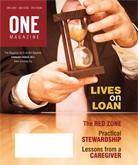
February-
March 2011
Lives on Loan:
The Importance of Christian Stewardship
E-Reader
----------------------
|

Don’t leave behind a field strewn with
the rubble of what you might have been,
or what you might have done.
The Red Zone
by Brenda Evans
Judgement Comes
At 7:15 AM, February 21, 1916, in northeastern France, judgment began. The German Fifth Army launched a 10-hour barrage of artillery fire along a 25-mile semi-circular front. The Battle of Verdun would not end until December 18. It was a 10-month ravage of human beings, forts, and forests—the longest battle of World War I. The German offensive was code-named Judgement.
Verdun’s history is ancient and glorious. In the Fifth Century, Attila the Hun attempted to overrun the city but failed. Four centuries later Charlemagne made it part of the Holy Roman Empire. By the 1880s, following the Franco-Prussian War, Verdun was considered impregnable. Situated safely within a wide ring of 18 large, underground forts and 12 smaller redoubts, Verdun’s formidable barrier was armed to the teeth with 75-mm and 155-mm fortress cannons.
But six months before the Battle of Verdun, French military leaders assessed the forts as antiquated and useless as a defensive system, so they began a stripping process. Half the artillery and ammunitions were removed; manpower was reduced to a maintenance force; even machine guns were boxed and stashed away in underground storage.
Then in February of 1916, intelligence sources sounded the alarm that Germany had its eye on Verdun. French High Command knew the sector was unprepared, so they rushed in two divisions. But Judgement was already upon them. The infantry count was 34 French battalions against 72 German battalions. French artillery was even more paltry: 300 75-mm field guns compared to 1,400 heavy and super-heavy German artillery and mortars.
By battle’s end, France had won. Certainly, they had bled Germany, but they had been wounded as well. Verdun was left a 465-square-mile tract of rubble containing corpses, both human and animal, white bones, empty eye sockets in desiccated skulls, undetonated ordnances, and deep craters. Pulverized buildings mounded like fresh graves over their occupants, entombing them. Verdun was blood-soaked, desecrated ground. Zone Rouge—Red Zone, the French called it.
To say the French were unprepared for the attack is blunt but accurate. Estimated casualties in the battle edge near the million mark, including 200,000 deaths. Scholars of the battle believe as many as 100,000 people still lie buried where they fell, undiscovered, unidentified, and unnamed.
War is hateful. Red Zones are inevitable. Verdun is a spiritual and social commentary on what human beings are capable of in our thirst for blood, power, and dominance. But on another level, Verdun is a parable on the theme of unpreparedness.
An Uneasy Comparison
I see a parallel in my own life. Preparation is an issue for me—a spiritual issue. I am in my Red Zone. If I’m blessed with long life (as my mother was), I have 20 more years. If I’m taken to Heaven as early as my father was, my death is near, very near—imminent, in fact. What I would do, I must do quickly.
I must avoid indifference. Some of our friends understand the urgency of preparedness. Helen and Ernest Joyce, or Ernie as we call him, have also sounded the alarm and laid out an intelligence report: “We’re not going to live forever on this planet, so here is a way to get prepared.”
Ernie is more keenly aware of the Red Zone than most Christians I have met, not just for himself or for Helen, but for all of us. He is a retired accountant who spent most of his career working on budgets for the Atomic Energy Commission at Oak Ridge, Tennessee.
He is passionate about getting things right, about decisions and preparedness, and has laid out a spreadsheet showing his plan. Survival of our work, our Christian labors and ministries, depends on what we do in our Red Zones. Ernie’s plan has little to do with great leaders like Crown Prince Wilhelm who led the German offense at Verdun. He is more concerned about ordinary troops like us who stand in the trenches, man the weapons, and make the advances—those who bleed, so to speak, for the cause of Christ. What will happen at our Verdun, he asks, when we’ve fallen in the field? Ernie sees beyond this life to what we leave behind when we’ve perished in the Red Zone.
Ernie has placed his “map” on the table. It is a spreadsheet, laying out what a soldier of the cross who is committed to generosity can do for the besieged body of Christ. It calls for soldiers to leave behind a portion of assets to endow the ministries we love. The numbers are startling—assets compounded over an extended period will fund the work of Christ long after we have fallen in the field. Ernie and Helen have a plan; they are prepared.
Robert Perry of Man, West Virginia, is another of our friends who understands the Christian implication of Red Zones. Robert has a plan. Generosity is its impetus—lump sum gifts to several ministries. The plan is written and ready. He is prepared.
But Robert is worried about his friend. Though a Christian, the man is unprepared, Robert says. “He has property but doesn’t have a will and doesn’t want one.” Robert sees this unpreparedness as foolishness, an unwise failure of a soldier of the cross. What God has put in our hands, we are responsible for—even through the Red Zone.
Preparing for the Red Zone
Preparing for our own Red Zone is about allegiance, assessment, and planning. Consider allegiance. It is about fidelity or faithfulness, devotion, and obligation. To whom or to what am I devoted? What is my obligation to the Lord of my salvation? Am I possessed by Him or by possessions? The men who won the Battle of Verdun had no question as to their allegiance or their responsibility.
And what about assessment? One week after the battle began, the French reassessed the gravity of their unpreparedness and committed themselves to a night-and-day replenishing of troops and ammunition. Along a narrow back road called the Voie Sacree, the Sacred Way, they brought up a continual stream of men and munitions. At all costs, they kept the men and supplies moving toward Verdun along that narrow road.
Indifference is the fierce enemy of spiritual assessment. Hard decisions are battles, and one of the biggest and most difficult is how to deal with end-of-life issues. Along the way, just like the French military, I must wisely assess and review the need and my obligation to plan for that need. Piddling or dawdling indifference is inexcusable.
Planning is crucial. Ernie and Helen have chosen endowments. Robert elects to give lump sum gifts. Bill and I have a charitable remainder trust. But other plans are available: gift annuities, revocable trusts, bequests in wills, or living trusts. Consider the Ten Percent Solution, that is, giving at least a tithe to the Lord’s work after your death. My husband Bill likes to talk—rather spookily—about “gifts from the grave.”
But I know what he means. Go into the Red Zone prepared. Don’t leave behind a field strewn with the rubble of what you might have been or what you might have done. Be prepared and pave the way for those who come behind you in The Sacred Way.
About the Writer: Brenda Evans is a retired English teacher. She and her husband Bill (former director of the Free Will Baptist Foundation) live in Cattletsburg, KY. They are proud grandparents of seven.
|
|

